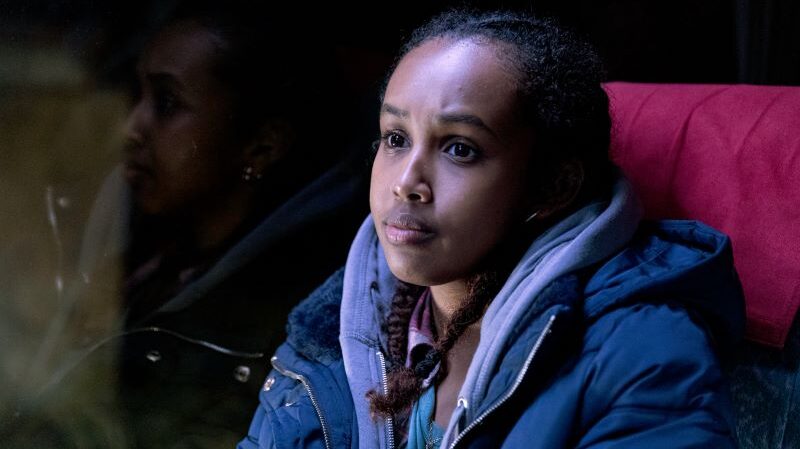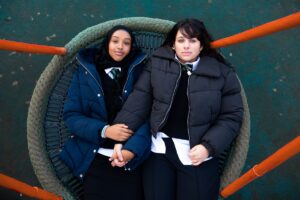
Brides: How Loneliness Can Cross Borders
Hadeel Alfaraj is a Syrian researcher and writer based in Swansea, with a Master’s in Sociology and current studies in Psychology. She focuses on displacement, resilience, and gender-based violence, and volunteers with community organisations supporting refugees and asylum seekers. Connect with her on LinkedIn.
Brides opened like a road I’d never walked yet somehow knew by heart. Nadia Fall’s debut feature, shot across Wales, Turkey, and Italy, follows Doe and Muna, two 15-year-old girls who leave a small English seaside town for Istanbul and then the Syrian border, chasing an idea of purity, belonging, and sisterhood. The film doesn’t thunder; it murmurs.
Choices like theirs aren’t born in a single moment. They grow quietly—in a liked comment, a late-night message, a glance over a shared prayer mat. That quiet accumulation makes the story feel close, even when the journey is far from anything I have lived.
In my years in Turkey—lectures by day, tram rides at dusk—I carried the ache of being between homes. My master’s research on intimate partner violence among Syrian refugee women showed the same pattern: control arriving as kindness, rules disguised as care, a girl’s world shrinking until obedience feels like safety. Brides understands that. The online “mentor,” Hanan, doesn’t recruit with rage but with lullabies—pure hearts, better lives, community. Even a religious adviser tells Doe to obey her mother without question, as if love means silence.
 The film shifts between present-day travel and glimpses of the girls’ lives: a mother’s boyfriend whose temper chills a room, a father’s sudden violence, school corridors where slurs pass as jokes. Grooming works like this—weave humiliation, longing, and certainty into a single thread, then pull until it feels like destiny.
The film shifts between present-day travel and glimpses of the girls’ lives: a mother’s boyfriend whose temper chills a room, a father’s sudden violence, school corridors where slurs pass as jokes. Grooming works like this—weave humiliation, longing, and certainty into a single thread, then pull until it feels like destiny.
Faith in Brides is not the villain. Loneliness is. Muna and Doe are not zealots; they are teenagers starving for attachment. If home feels brittle and school hostile, any voice saying “you belong to us” can sound like rescue. I saw this long before the UK—in Syria and later in Turkey. Sometimes it was a partner, other times, a so-called “sister.” The method was always the same: isolate, flatter, turn fear into proof of loyalty. In real life, the ending might be a forced marriage to an ISIS fighter.
One of the film’s strengths is how Islam appears in gestures, not speeches. The Turkish family who takes the girls in doesn’t preach; they feed them, make space at the table, share prayer mats.
The mother notices their manners, smiles at their Bismillah, and calls them “polite girls.” It’s an Islam of warmth and open doors—the kind I’ve known in kitchens and crowded living rooms.
In Wales, I have felt that same warmth—a neighbour’s smile, a shopkeeper slowing his words. But misunderstandings run alongside it. My own son, still finding his way in English, has been blamed for things he couldn’t explain—standing there with his face flushed, not from guilt, but from the frustration of words trapped in his throat. In the film, both girls, from migrant families, live in that same in-between space—silence mistaken for defiance, awkwardness taken as guilt. Over time, that erodes belonging until even the wrong welcome can feel like a way out. 
A Welsh answer would start early: patient listening in schools, family support without shame, teaching young people to spot love-bombing before it takes root. It means resourcing groups like Swansea Asylum Seekers Support (SASS), EYST, with its focus on youth, and Swansea MAD, where teenagers learn safe digital skills. I volunteer in these places because I believe in what they do, and because I am a mother who thinks constantly about the world my children are growing up in. I want them to be in communities that notice when a young person begins to slip away and reach out before danger gets there first. I see that in Swansea Women’s Group, where little girls and their mothers share activities and laughter, learning to trust each other. Swansea is only one example—across Wales, community centres and grassroots organisations are quietly creating spaces where belonging is offered before someone else tries to sell it. Brides isn’t about “other people’s children”—it’s a mirror. If we widen the circle soon enough, they can keep their laughter — and their freedom — without ever mistaking a cage for a home.
Brides is coming to cinemas across the UK from September 26, 2025.
This article was featured on Nation Cymru.
The film has various connections to Wales including co-producers Alice Lusher and Catryn Ramasut of ie ie Productions. Brides was partly filmed in Cardiff, Barry, Ogmore, Southerndown and Porthcawl and received funding from Ffilm Cymru Wales and Creative Wales.
This article was commissioned by Film Hub Wales as part of its Made in Wales project, which celebrates films with Welsh connections, thanks to funding from Creative Wales and the National Lottery via the BFI.